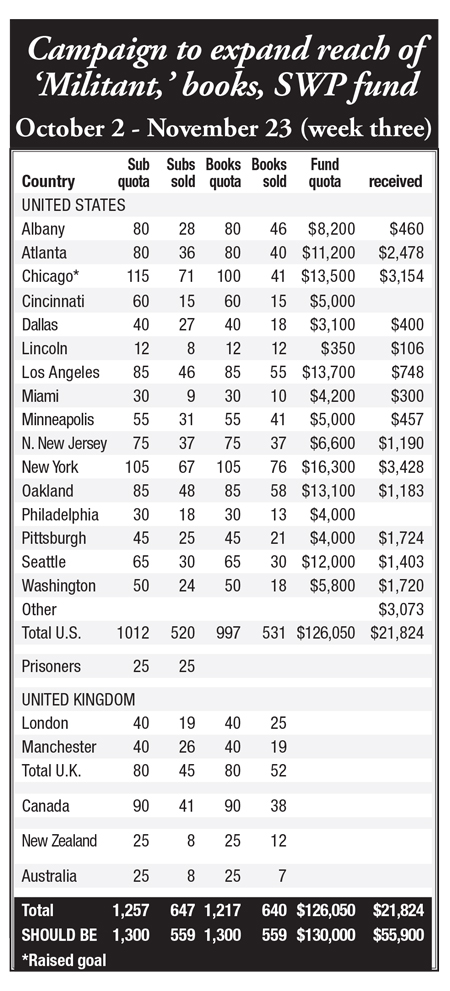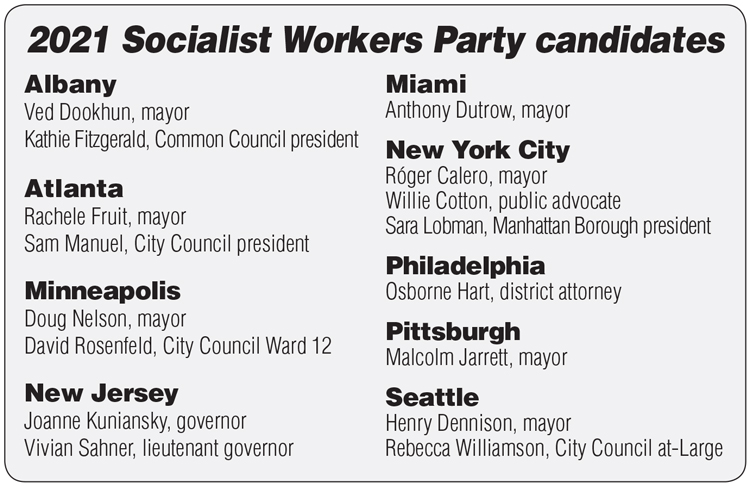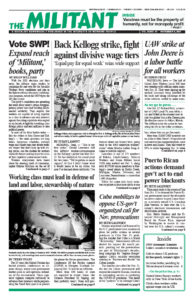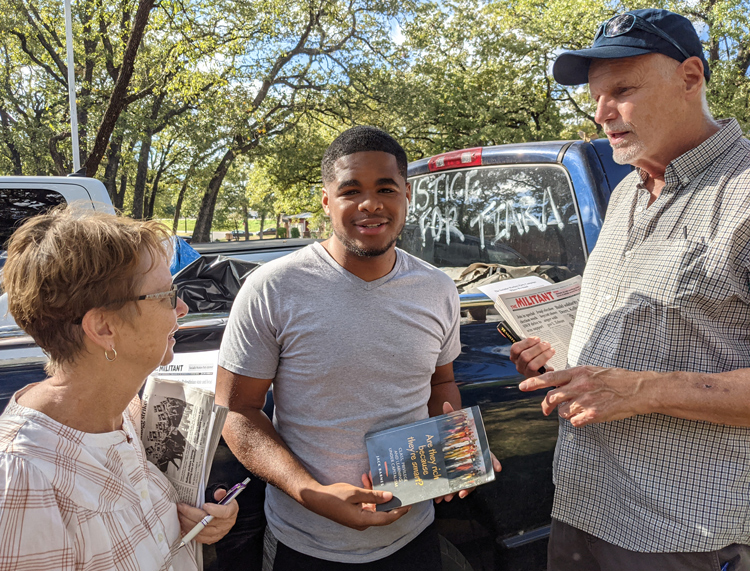With the 2021 elections just days away, the Militant urges readers to campaign for and vote for the Socialist Workers Party candidates and join in the fight to advance the party’s working-class program, which the SWP fights for 365 days a year.
The party’s candidates are spreading the word about today’s strike struggles, joining picket lines and building much-needed solidarity. They explain that workers are capable of acting together as a class to advance our own interests against the ruling capitalists who exploit us on the job, to fight for a working-class foreign policy and lead millions to take political power.
In most of the labor battles today — like the strikes at John Deere and Kellogg’s — the main questions are long hours, dangerous schedules, multiple wage and benefit tiers that divide workers, wages that don’t keep up with rising prices, and the disdain for workers shown by bosses seeking to put the crisis of their capitalist system on our backs.
Workers everywhere have heard about the shooting death of cinematographer Halyna Hutchins on the set of Alec Baldwin’s movie “Rust” in New Mexico. In the days since, it has become clear the responsibility for the catastrophe is the cost-cutting, profit-driven conditions on the set — like on the sets of Hollywood productions everywhere.
This is why members of the International Alliance of Theatrical Stage Employees — the union that represents 60,000 behind-the-camera workers on productions like “Rust” —threatened to strike over conditions like those by a vote of over 90%. Daily schedules of 14 to 16 hours, few meal breaks, speedup that cuts corners — including on things like whether guns ready for use are loaded or not — are the norm. Set workers report there had been a number of earlier accidental prop gun discharges.
The morning of the shooting seven workers on the set held a protest about conditions on “Rust” and were ordered off the set by the producers — who include Alec Baldwin — and replaced by nonunion crew members. The death of Hutchins was a product of these working conditions, of the capitalist rulers’ drive for profits.
As boss attacks on working people continue, SWP campaigners find a real interest in their program and activities.
In addition, a big political obstacle facing the working class is the capitalist two-party setup. Democrats and Republicans alternate in government claiming they are the “lesser evil,” while both defend a system founded on our exploitation and oppression. Working people need a political party of our own, a labor party based on the unions that can bind workers together in common struggle and build a movement to take political power out of the hands of the capitalist rulers and establish a workers and farmers government.
Campaigning for the SWP’s revolutionary program doesn’t end Nov. 2. Over the following three weeks campaign supporters can join in successfully concluding the international drive to sell 1,300 Militant subscriptions, 1,300 books by SWP and other revolutionary leaders and raise $130,000 for the annual Party-Building Fund. And the fight to win more working people to this perspective goes on following the drive.
SWP campaigns provide an opportunity for the communist movement to defend its political rights in the face of the rulers’ attempts to restrict ballot status of working-class parties. They provide an opportunity to reach out broadly, leverage the hearing the party gets and to build our movement here and around the world.
Keep campaigning for the SWP
In Minneapolis, Doug Nelson, SWP candidate for mayor, and David Rosenfeld, the party’s candidate for City Council, Ward 12, spoke with Akima Fields Oct. 23. He had met Nelson several months earlier while the campaign was collecting signatures to put the SWP candidate on the ballot.
Fields asked the candidates what had happened to the workers who were locked out by Marathon Petroleum in St. Paul Park.
“After a six-month battle the Teamsters went back with their union intact, with dignity and pride in their fight,” Nelson said. “They refused to return before the company reinstated workers who were fired at the beginning of the fight.”
 Fields, an assembly worker, said he first learned about unions when he worked in construction in Harlem, in New York. Workers of all backgrounds would load up into a union van, he said, and drive to a construction site where “the union representative would tell the bosses to hire the union members. That’s the power they had.”
Fields, an assembly worker, said he first learned about unions when he worked in construction in Harlem, in New York. Workers of all backgrounds would load up into a union van, he said, and drive to a construction site where “the union representative would tell the bosses to hire the union members. That’s the power they had.”
Fields subscribed to the Militant and purchased the books Are They Rich Because They’re Smart? Class, Privilege, and Learning Under Capitalism and Malcolm X, Black Liberation, and the Road to Workers Power, both by SWP National Secretary Jack Barnes.
On Oct. 23, in Fort Worth, Texas, SWP campaigner Dennis Richter met Percy Gipson, a recent high school graduate now enrolled in an aviation mechanic school. He said four years ago his 18-year-old cousin, Tiara Williams, was shot dead as she sat in her car. “Tiara was caught between crossfire. The police did an initial investigation, but nothing more was done,” he said. Students at the high school where Gipson studied organized a demonstration to demand a further inquiry.
“Criminal violence and gangs come from the workings of the capitalist system,” Richter said. They breed fear and demoralization, and undermine working-class solidarity. When millions of working people joined together to uproot Jim Crow segregation, “crime went down,” Richter said. “We need to build a similar movement led by the working class.”
Gipson subscribed to the Militant, bought Are They Rich Because They’re Smart? and pledged to contribute to the SWP Party-Building Fund.
Rachele Fruit, the SWP candidate for Atlanta mayor, and supporter Martin Navera campaigned in McDonough, Georgia, Oct. 16, a mile from the John Deere distribution center here where some 80 UAW members are on strike.
They met John Hall, who was interested in the book Malcolm X, Black Liberation, and the Road to Workers Power. “The book talks about what Malcolm learned in the last year of his life from meeting revolutionary fighters in Cuba and Africa. He saw that the solutions he was looking for went beyond Black nationalism,” Navera said. “Yes,” said Hall, “he saw that oppression was a global problem. But what are you doing? What’s your aim?”
Fruit said Malcolm was a revolutionary who explained that the capitalist system needed to be overthrown and replaced. “We are revolutionaries too. We think it will take a revolution in the United States to end wars, exploitation and racism. We look to the Cuban Revolution as an example of the kind of society human beings can build.”
“You know you are in the Black community here, don’t you?” asked Hall. Navera responded, “We’re here because we don’t care what color your skin is. It will take all of us to build a movement to support every worker’s struggle.”
“That’s what I wanted to hear! How can I join you guys?” said Hall, who subscribed to the Militant and purchased Malcolm X, Black Liberation, and the Road to Workers Power and Are They Rich Because They’re Smart?
To help win new readers to the Militant, books that tell the lessons for today of past revolutionary struggles and to contribute to the SWP Party-Building Fund, contact the branch of the party nearest you.



